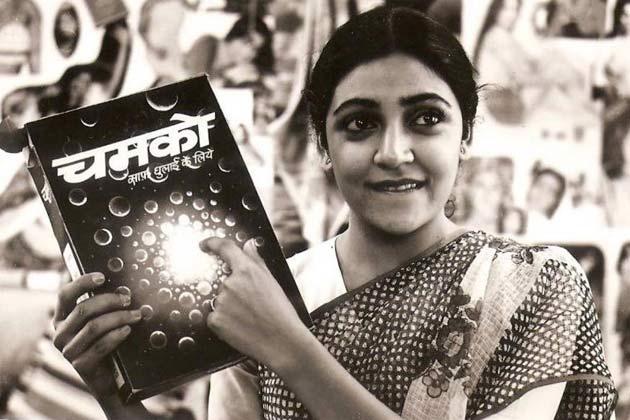Miss Chamko
All good things – they say – happen by
chance. In the space of ten days I saw Deepti Naval on large
screen and on the stage.
How in the minimum screen time in Mirch
Masala she conveyed the frustration and helplessness – despite being the
village mukhiya’s wife – with her
eyes; that feeling off oneness with the women held in captivity, through that one look
from behind the window. That defiance when coming out of home and banging
vessels or walking her daughter to school for the first time! Amidst the stellar cast of the movie she shone; she did not come out and hit you all of a sudden but she touched you and stayed with you. I was reminded of an article I had read some years ago that hers are the only eyes that can cry and laugh at the same
time on screen.
It has been her eyes – over the years
– that have taken the audience to her (on
screen) world then. Be it Chasme
Buddoor – which with a group of friends I recall enjoying more than few times –
as someone in love, as someone learning music or simply as Miss Chamko! One of the more endearing of names that hindi cinema has gifted its viewers with. Or recently in Listen Amaya where she displays a rare
restraint when she is angry at her daughter but is silent and relents as the
daughter is her priority. Reminded me of mumi then, with her priority: me; a couple of times when I had done what I had then thought was correct. With Farooque Sheikh she ever made us feel as if we
were not watching a movie but were watching them; they were one of us or the
other way around! I must confess here that during growing up years Saath Saath
was one of the most frequently played audio cassettes at home. As I write I can see
her happy eyes in tum ko dekha to yeh kahala aaya.
From: http://www.ibnlive.com/news/india/how-the-new-chashme-baddoor-killed-the-classic-chamko-scene-600962.html
In Ek Mulaqaat her performance blew me away. Like Tumhari Amrita this play
is a conversation between two people who know each other very well. No big sets,
no fussy costumes, no supporting cast (except
a voice in this case). Simplicity of this nature one seldom comes across;
it is either too under-rated or too difficult! The conversations were
brilliantly done, one felt as if one was watching both of them from the adjacent
terrace. An example of how good writing coupled with good performances can hold a varied audience. Also this was no Prithvi Theatre that allows connect with a small audience, but a large auditorium. And from where my 500/- worth of ticket allowed me to sit, it was kind of difficult to even see her eyes. Shekhar Suman was good or rather very good at reciting Sahir
though one has a bias for another baritone while listening to Sahir; especially Kabhi Kabhi. He also
possibly had the more interesting one-liners or conversation-enders as well. I was also left wondering how they could memorize (and recite) such long lines, such difficult poetry.
The images which played in the back-ground brought-out Deepti Naval's elegance and exquisiteness in an understated manner; not uncommon for her. For me though the play was about the warmth in her tone that brought out the depth of their relationship, their friendship, their bonding. She conveyed the years passed in love unrequited and the angst of a writer who is not sure if her lover has read all that she wrote for him; writing that won her laurels. How she recites Sahir’s poem to Sahir himself – picking on the gaps in his claims as they conversed – to replying, when she is busy knitting a sweater on the terrace in isolation and is asked; are you knitting a sweater or writing a poem? ‘Jazbaa to woh hi hai’. At one point I was reminded of the classic Guru Dutt line from Kagaz Ke Phool, 'Kabhi kabhi log ek doosre ko itni achi tarah se kyun samajne lagte hain!' And, of course, I wish I understood the wonderfully sung Punjabi song.
The images which played in the back-ground brought-out Deepti Naval's elegance and exquisiteness in an understated manner; not uncommon for her. For me though the play was about the warmth in her tone that brought out the depth of their relationship, their friendship, their bonding. She conveyed the years passed in love unrequited and the angst of a writer who is not sure if her lover has read all that she wrote for him; writing that won her laurels. How she recites Sahir’s poem to Sahir himself – picking on the gaps in his claims as they conversed – to replying, when she is busy knitting a sweater on the terrace in isolation and is asked; are you knitting a sweater or writing a poem? ‘Jazbaa to woh hi hai’. At one point I was reminded of the classic Guru Dutt line from Kagaz Ke Phool, 'Kabhi kabhi log ek doosre ko itni achi tarah se kyun samajne lagte hain!' And, of course, I wish I understood the wonderfully sung Punjabi song.
Thank you Deepti Naval for letting me experience this
fan-boy feeling all over again!

Comments
Post a Comment